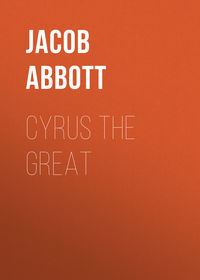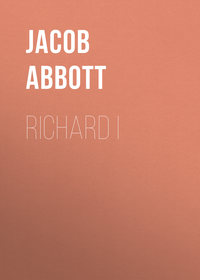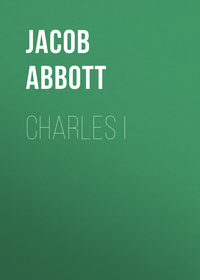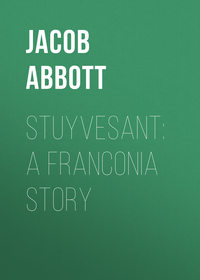
Margaret of Anjou
Margaret's parents.
Margaret's father and mother did not take their leave of her at this place, but went on with her two days' journey, as far as to the town of Bar le Duc, which was near the frontiers of Lorraine. Here they, too, at last took their leave, though their hearts were so full, when the moment of final parting came, that they could not speak, but bade their child farewell with tears and caresses, unaccompanied with any words whatever of farewell.
The bride's new friends.
Still Margaret was not left entirely alone among strangers when her father and mother left her. One of her brothers, and some other friends, were to accompany her to England. She had, moreover, by this time become well acquainted with the Marquis and Marchioness of Suffolk, under whose charge and protection she was now traveling, and she had become strongly attached to them. They were both considerably advanced in life, and were grave and quiet in their demeanor, but they were very kind and attentive to Margaret in every respect, and they made every effort in their power to console the grief that she felt at parting with her parents and friends, and leaving her native land, and they endeavored in every way to make the journey as comfortable and as agreeable as possible to her.
The vessel. Causes of delay.
During all this time a vessel, which had been dispatched from England for the purpose, was waiting at a certain port on the northern coast of France called Kiddelaws, ready to take the queen and her bridal train across the Channel. The distance from Nancy to this port was very considerable, and the means and facilities for traveling enjoyed in those days were so imperfect that a great deal of time was necessarily employed on the journey. Besides this, a long delay was occasioned by the want of funds. King Henry had himself agreed to defray all the expenses of the marriage, and also of the progress of the bridal party through France to England. These expenses were necessarily great, and it happened at this time that the king was in very straitened circumstances in respect to funds. He was greatly embarrassed, too, in the efforts which he made to procure money, by the difficulties which were thrown in his way by the party of the Duke of Gloucester, who resisted by every means in their power all action of Parliament tending to furnish the king's treasury with money, and thus promote the final accomplishment of the marriage.
Henry's want of money.
In consequence of all these difficulties and delays, it was nearly three months from the time when the bridal ceremony was performed at Nancy before Margaret was ready to embark for England in the vessel that awaited her at Kiddelaws.
Expenses to be incurred in England.
It was not merely for the expenses of the journey through France of Margaret and her train that Henry had to provide. On her arrival in England there was to be a grand reception, which would require many costly equipages, and the giving of many entertainments. Then, moreover, the marriage ceremony was to be performed anew, and in a far more pompous and imposing manner than before, and after the marriage a coronation, with all the attendant festivities and celebrations. All these things involved great expense, and Margaret could not come into the kingdom until the preparations were made for the whole. To such straits was the king reduced in his efforts to raise the money which he deemed necessary for the proper reception of his bride, that he was obliged to pledge a large portion of the crown jewels, and also of the family plate and other personal property of that kind. A considerable part of the property so pledged was never redeemed.
Passage across the Channel. Rough weather.
At length, however, things were so far in readiness that orders arrived for the sailing of the expedition. The party accordingly embarked, and the vessel sailed. They crossed the Channel, and entered Portsmouth harbor, and finally landed at the town of Porchester, which is situated at the head of the harbor. The voyage was not very agreeable. The vessel was small, and the Channel in this place is wide, and Margaret was so sick during the passage, and became so entirely exhausted, that when the vessel reached the port she could not stand, and Suffolk carried her to the shore in his arms.
Margaret's reception.
The boisterous weather which had attended the party during their voyage increased till it ended in a dreadful storm of thunder, lightning, and rain, which burst over the town of Porchester just at the time while the party were landing. The people, however, paid no attention to the storm and rain, but flocked in crowds into the streets where the bride was to pass, and strewed rushes along the way to make a carpet for her. They also filled the air with joyful acclamations as the procession passed along. In this way the royal bride was conveyed through the town to a convent in the vicinity, where she was to rest for the first night, and prepare for continuing her journey to London.
Passage to Southampton.
The next day, the weather having become settled and fair, it was arranged that Margaret and her party should be conveyed from Porchester to Southampton along the shore in barges. The water of this passage is smooth, being sheltered every where by the land. The barges first moved down Portsmouth harbor, then out into what is called the Solent Sea, which is a narrow, sheltered, and beautiful sheet of water, lying between the Isle of Wight and the main land, and thence, entering Southampton Water, they passed up, a distance of eight or ten miles, to the town.4
The queen takes lodgings in a convent.
On the arrival of the queen at Southampton, she was conveyed again to a convent in the vicinity of the town, for this was before the days of hotels. Here she was met by persons sent from the king to assist her in respect to her farther preparations for appearing at his court. Among other measures that were adopted, one was the sending a special messenger to London to bring an English dressmaker to Southampton, in order that suitable dresses might be prepared for the bride, to enable her to appear properly in the presence of the English ladies at the approaching ceremonies.
The king. Lichfield Abbey. Margaret is seriously sick.
In the mean time, King Henry, whom the rules of royal etiquette did not allow to join the queen until the time should arrive for the performance of the second part of the nuptial ceremony, came down from London, and took up his abode at a place ten or twelve miles distant, called Southwick, where he had a palace and a park. The nuptials were to be celebrated at a certain abbey called Lichfield Abbey, which was situated about midway between Southampton, where the queen was lodged, and Southwick, the place of waiting for the king. The king had expected that every thing would be ready in a few days, but he was destined to encounter a new delay. Margaret had scarcely arrived in Southampton when she was attacked by an eruptive fever of some sort, resembling small-pox, which threw all her friends into a state of great alarm concerning her. The disease, however, proved less serious than was at first apprehended, and after a week or two the danger seemed to be over.
During all the time while his bride was thus sick Henry remained in great suspense and anxiety at Southwick, being forbidden, by the rigid rules of royal etiquette, to see her.
Recovery.
At length Margaret recovered, and the day was appointed for the final celebration of the nuptials. When the time arrived, Margaret was conveyed in great state, and at the head of a splendid cavalcade, to the abbey, and there the marriage ceremony was again performed in the presence of a great concourse of lords and ladies that had come from London and Windsor, or from their various castles in the country around, to be present on the occasion.
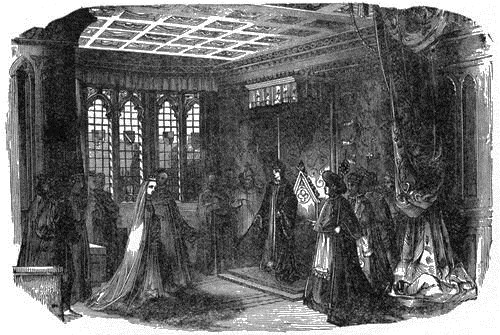
Suffolk Presenting Margaret to the King.
1445. The final ceremony.
This final ceremony was performed in April, 1445. Of course, as Margaret was born in March, 1429, she was at this time sixteen years and one month old.
Strange bridal present.
Among other curious incidents which are recorded in connection with this wedding, there is an account of Margaret's receiving, as a present on the occasion—for a pet, as it were, just as at the present day a young bride might receive a gift of a spaniel or a canary-bird—a lion. It was very common in those times for the wealthy nobles to keep such animals as these at their castles. They were confined in dens constructed for them near the castle walls. The kings of England, however, kept their lions, when they had any, in the Tower of London, and the practice thus established of keeping wild beasts in the Tower was continued down to a very late period; so that I remember of often reading, when I was a boy, in English story-books, accounts of children, when they went to London, being taken by their parents to see the "lions in the Tower."
The lion sent to the Tower.
Margaret sent her lion to the Tower. In the book of expenses which was kept for this famous bridal progress, there is an account of the sum of money paid to two men for taking care of this lion, feeding him and conveying him to London. The amount was £2 5s. 3d., which is equal to about ten or twelve dollars of our money. This seems very little for such a service, but it must be remembered that the value of money was much greater in those times than it is now.
Margaret continues her journey toward London. Rejoicings.
Immediately after the marriage ceremony was completed, the preparations for the journey having been all made beforehand, the king and queen set out together for London, and it soon began to appear that this part of the journey was to be more splendid and gay than any other. The people of the country, who had heard marvelous stories of the youth and beauty and the early family misfortunes of the queen, flocked in crowds along the roadsides to get a glimpse of her as she passed, and to gaze on the grand train of knights and nobles that accompanied her, and to admire the magnificence of the dresses and decorations which were so profusely displayed. Every body came wearing a daisy in his cap or in his buttonhole, for the daisy was the flower which Margaret had chosen for her emblem. At every town through which the bride passed she was met by immense crowds that thronged all the accessible places, and filled the windows, and in some places covered the roofs of the houses and the tops of the walls, and welcomed her with the sound of trumpets, the waving of banners, and with prolonged shouts and acclamations.
The Duke of Gloucester. His plans. His invitation to the queen.
In the mean time, the Duke of Gloucester, who, with his party, had done every thing in his power to oppose the marriage, now, finding that it was an accomplished fact, and that all farther opposition would not only be useless, but would only tend to hasten and complete his own utter downfall, concluded to change his course, and join heartily himself in the general welcome which was given to the bride. His plan was to persuade the queen that the opposition which he had made to King Henry's measures was directed only against the peace which had been made with France, and which he had opposed for political considerations alone, but that, so far as the marriage with Margaret was concerned, he approved it. So he prepared to outdo, if possible, all the rest of the nobility in the magnificence of the welcome which he was to give her on her arrival in London. He possessed a palace at Greenwich, on the Thames, a short distance below London, and he sent an invitation to Margaret to come there on the last day of her journey, in order to rest and refresh herself a little preparatory to the excitement and fatigue of entering London. Margaret accepted this invitation, and when the bridal procession began to draw nigh, Gloucester came forth to meet her at the head of a band of five hundred of his own retainers, all dressed in his uniform, and wearing the badge of his personal service. This great parade was intended partly to do honor to the bride, and partly to impress her with a proper sense of his own rank and importance as one of the nobles of England, and of the danger that she would incur in making him her enemy.
Great preparations in London. Curious exhibitions. Justice and peace.
Very splendid preparations were made in the city of London to do honor to the royal bride in her passage through the city. It was the custom in those times to exhibit in the streets, on great public days, tableaux, and emblematic or dramatic representations of certain truths or moral sentiments appropriate to the occasion, and sometimes of passages of Scripture history. A great many of these exhibitions were arranged by the citizens of London, to be seen by the bride and the bridal procession as they passed through the streets. Some of these were very quaint and queer, and would only be laughed at at the present day. For instance, in one place was an arrangement of two figures, one dressed to represent justice, and the other peace; and these figures were made movable and fitted with strings, so that, at the proper moment, when the queen was passing, they could be made to come together and apparently kiss each other. This was intended as an expression of the text, justice and peace have kissed each other, which was considered as an appropriate text to characterize and commemorate the peace between England and France which this marriage had sealed. In another place there was an emblematical pageant representing peace and plenty. There were also, at other places, representations of Noah's ark, of the parable of the wise and foolish virgins, of the heavenly Jerusalem, and even one of the general resurrection and judgment day.
The queen passes through London.
On the morning of the day appointed for the queen's entry into London, the pageants having all been prepared and set up in their places, a grand procession of the mayor and aldermen, and other dignitaries, was formed, and proceeded down the river toward Greenwich, in order to meet the queen and escort her through the city. These civic officers were all mounted on horseback, and dressed in their gay official costumes. The chiefs were dressed in scarlet, and the body of their followers, arranged in bands according to their respective trades, wore blue gowns, with embroidered sleeves and red hoods. In this way the royal procession was escorted over London Bridge, and through the principal streets of the city to Westminster, where the bride was at length safely received in the palace of her husband.
The coronation. The queen left to repose.
This was on the 28th of May. Two days afterward Margaret was crowned queen in Westminster with great parade and ceremony. The coronation was followed by a grand tournament of three days' duration, accompanied with banquets and other festivities usual on such occasions, and then at length the bride had the satisfaction of feeling that the long-protracted ceremony was over, and that she was now to be left to repose.
CHAPTER VII.
Reception in England
Duke of Gloucester.
Notwithstanding the grand reception which the Duke of Gloucester gave to Margaret on her arrival in England, she knew very well that he had always been opposed to her marriage, and had not failed to do all in his power to prevent it. She accordingly considered him as her enemy; and though she endeavored at first, at least, to treat him with outward politeness, she felt a secret resentment against him in heart, and would have been very glad to have joined his political enemies in effecting his overthrow.
The cardinal. Margaret's affection for Lord and Lady Suffolk. Quarrel.
Cardinal Beaufort and the Earl of Suffolk, as has already been said, were Gloucester's rivals and enemies. The cardinal was a venerable man, now quite advanced in years. He was, however, extremely ambitious. He was immensely wealthy, and his wealth gave him great influence. He had, moreover, been the guardian of the king during his minority, and in that capacity had acquired a great influence over his mind. The Earl of Suffolk, who, with his lady, had been sent to France to bring Margaret over, had inspired Margaret with a great friendship for him. She felt a strong affection for him, and also for Lady Suffolk, not only on account of their having acted so important a part in promoting her marriage, but also on account of the very kind and attentive manner in which they had treated her during the whole period of her journey. Thus the cardinal and Suffolk, on the one hand, had the advantage, in their quarrel with the Duke of Gloucester, of great personal influence over the king and queen, while Gloucester himself, on the other hand, enjoyed in some respects a still greater advantage in his popularity with the mass of the people. Every body perceived that the old quarrel between these great personages would now, on the arrival of the queen in England, be prosecuted with more violence than ever, and all the courtiers were anxious to find out which was likely to be the victor, so that, at the end of the battle, they might be found on the winning side.
Margaret is left to herself.
As soon as the coronation was over, the principal personages who had been sent with Margaret by her father, for the purpose of accompanying her on her journey, and seeing her properly and comfortably established in her new home, were dismissed and allowed to set out on their return. They all received presents in money from King Henry to reimburse them for the expenses of the journey which they had made in bringing him his bride.

Ancient Portrait of Queen Margaret.
Repair of the palaces. The king's want of money.
Margaret was thus left to herself in the new station and new sphere of duty to which she had been transferred. All the royal palaces had been fitted up expressly for her reception. This was very necessary in fact, for some years had elapsed since there had been a queen in England, and all the royal residences had become very much out of repair. Those were rude times, and even the palaces and castles that were built for kings and queens were at best very comfortless dwellings. But when, during a long minority, they were abandoned to the rude tenants and rough usages to which at such times they were sure to be devoted, they came, in the end, to be little better than so many barracks for soldiery. It required a great deal of time, and no little expense, to prepare the Tower and the palaces of Westminster and Richmond for the reception of a young and beautiful queen, and of the gay company of ladies that were to attend her. King Henry was so destitute of money at this time that he found it extremely difficult to provide the means of paying the workmen. There is still extant a petition which the clerk of the works sent in to the king, praying him to supply him with more money to pay the men, for the labor was so poorly paid, and the wages were so much in arrears, that it was extremely difficult for him to find men, he said, to go on with the work.
The queen attaches herself to Cardinal Beaufort. Jealousy of Gloucester.
The palaces were, however, at last made ready before Margaret came. There were apartments for her in the Tower, and there were also three other palaces in and near London, in either of which she could reside at her pleasure. Besides this, the cardinal, who, as has already been remarked, was possessed of immense wealth, owned, among his other establishments, a beautiful mansion at Waltham Forest, a few miles north of London. The cardinal set apart a state chamber in this house for the exclusive use of the queen when she came to visit him, and caused it to be fitted up and furnished in a magnificent manner for her. The drapery of the bed was of cloth of gold from Damascus, and the other furniture and fittings were to correspond. The queen used often to go and visit the cardinal at this country seat. She soon became very fond of him, and willing to be guided by his counsel in almost every thing that she did. Indeed, the ascendency which the cardinal thus exercised over Margaret greatly increased his power over the king. The affairs of the court and of the government were directed almost wholly by his counsels. The Duke of Gloucester and the nobles of his party became more and more indignant and angry at this state of things. The realm of England, they said, through the weakness and imbecility of the king, had fallen into the hands of a priest and of a woman—a French woman, too.
Great mistakes often made.
But there was nothing that they could do. Margaret was so young and so beautiful that every body was captivated with her person and behavior, and whatever she did was thought to be right. Indeed, the general course which she pursued on her first arrival in England was right in an eminent degree. There have been many cases in which young queens, in coming as Margaret did, away from their native land and from all their early friends, to reign in a foreign court, have brought with them from home personages of distinction to be their favorites and friends in their new position. But when this is done, jealousies and ill-will always sooner or later spring up between these relatives and friends of the foreign bride and the old native advisers of the king her husband. The result is, in the end, a king's party and a queen's party at court, and perpetual quarrels and dissensions ensue, in which at least the people of the country are sure to become involved, from their natural jealousy of the foreign influence, as they call it, introduced by the queen.
Margaret's friends and counselors. Her good sense. Example for all young brides.
Queen Margaret had the good sense to avoid this danger. All the principal persons who came with her to England, for the purpose of accompanying her on the journey, and of carrying back to her father and friends in France authentic assurances of her having been honorably received by her husband as his bride and queen, were dismissed and sent home again immediately after the coronation, as we have already seen. Margaret retained only certain domestic servants, and perhaps some two or three private and personal friends. As for counselors and advisers, she threw herself at once upon the ministers and counselors of the king—the Cardinal Beaufort, who had been his guardian from childhood, and the Earl of Suffolk, who was one of his principal ministers, and had been sent by him, as his proxy and representative, to negotiate the marriage and bring home the bride. She made Lady Suffolk, too—the wife of the earl—her most intimate female friend. She appointed her to the principal place of honor in her household, and in other ways manifested great affection for her. The good sense and discretion which she thus manifested—young as she was, for she was not yet seventeen—in choosing for her confidential friend a lady of the age and standing of Lady Suffolk, instead of attempting to place in that position some foreign belle of her own years, whom she had brought with her for the purpose from her native land, as many young brides in her situation would have done, deserves much commendation. In a word, Margaret, in becoming a wife, gave herself up entirely to her husband. She made his friends her friends, and his interests her interests, and thus transferred herself, wholly and without reserve, to her new position; an example which all young ladies whose marriage brings them into entirely new circumstances and relations would do well to follow. Nothing is more dangerous than the attempt in such cases to bring from the old home influences in any form to be introduced with a view of sharing the control in the new.
Opinions in England.
In consequence of the discreet course of conduct that Margaret thus pursued, and of the effect produced on the court by her beauty, her vivacity, and her many polite accomplishments, public opinion—that is, the opinion of the outside world, who knew nothing of her secret designs or of her real character—turned very soon after her arrival in England entirely in her favor. As has already been said, the general sentiment of the nobles and of the people was strongly against the match when it was first proposed. They opposed it, not because they had any personal objection to Margaret herself, but because, in order to prepare the way for it, it was necessary to make peace with France, and in making peace, to grant certain concessions which they thought would weaken the power of the English on the Continent, and, at any rate, greatly interfere with the farther extension of their power there. But when the people came to see and know the queen, they all admired and loved her.



